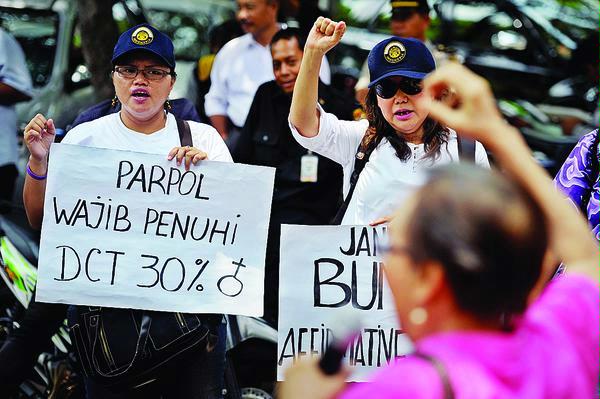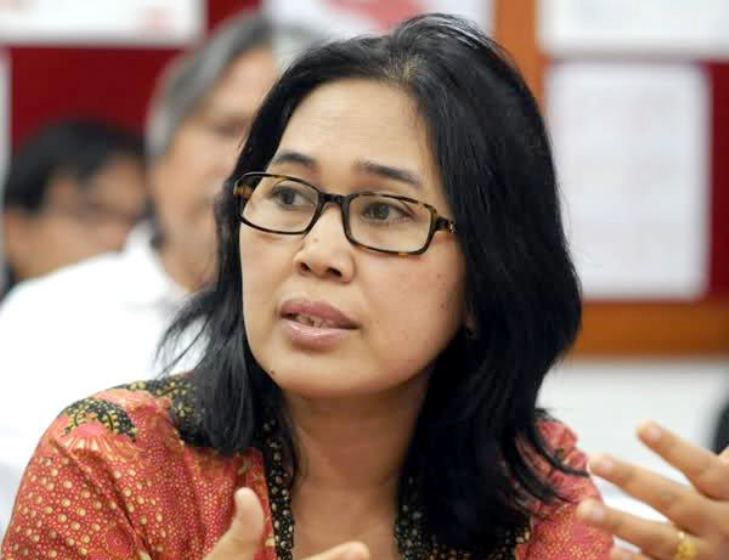
Activists from the Civilian Community Alliance for Women and Politics hold signs reminding parties that they are required to fulfil the 30% quota. Photo credit: Kompas.com
The hustle and bustle of the April 9 legislative elections in Indonesia is not over yet. Right now, many of the 235,637 candidates are closely monitoring the recap of election results at the sub-district, district, province, and national levels. While the formal count from the Indonesian General Elections Commission (KPU) will not be declared until May 9, preliminary results raise questions about the future of female candidates in Indonesia’s elections.
One of the most important milestones in this election was the enforcement of a regulation that requires each political party to field at least 30 percent female candidates to participate in an electoral district and distribute them evenly on the ballot paper – one woman for every two men. The quota was first introduced in 2004, and though heavily promoted was not fully enforced in 2009 elections. The proportion of women in parliament increased from 11 percent in the 2004 elections to 18 percent in the 2009 elections. Strict application of the quota by the KPU in the lead up to this year’s legislative elections suggests the figure could rise again. This year, the KPU disqualified 77 candidates from five parties in seven electoral districts because they did not attain the 30 percent threshold – something beyond imagination five years ago.
Indonesians also saw greater visibility for women candidates during campaigning in the lead up to this year’s elections. Magazines ran profiles on smart and young female candidates, TV stations ran numerous debates with lively engagement from the women candidates, and radio stations featured talk shows that spotlighted women candidates’ platforms. More than ever before, government and civil society organizations also organized trainings for female candidates with hopes that potential candidates with integrity and clear objectives could win a seat.
Despite these efforts, many talented women appear to have missed out. Temporary results from the provincial legislative election (DPRD) in Aceh suggest that there will be only five women among the 81 parliamentarians (6.2 percent). This is comparable to the 2009 election, when just four female legislators were elected (5.8 percent). Four of the female legislators elected this time around were from Golkar Party, which secured nine seats overall. The fifth female legislator was from Partai Aceh (PA), which snared 29 seats in total. Compliance with the 30 percent quota at the local level in Aceh has been patchy, but this is not enough to explain the poor showing of women candidates in PA. It is difficult, too, to blame a conservative Aceh electorate when almost half of the successful Golkar candidates were women. One might conclude, therefore, that PA’s female candidates were either too new to politics to make a name for themselves prior to the election, or were just there to make up the numbers on the ballot paper.
It was not only inexperienced newcomers who missed out, but also seasoned political players. Just like their male counterparts, women candidates were impacted by allegations of vote buying and the fixing election results by local election committees. Eva Kusuma Sundari, a prominent female candidate from the PDI-P Party, a champion of gender equality and human rights, and a member of parliament since 2004, claimed she lost her seat at the national parliament because of vote buying.

Eva Kusuma Sundari, a well respected PDIP politician from East Java has served two terms in the national parliament. Shocked by defeat, Sundari argues that the entire electoral process is riddled with money-politics.
So what’s next for those candidates who did not get elected? It is important for those competent women who did not make the cut this time to remain active in politics and continue to push for reform, even if they do so from outside parliament. It was unfortunate to witness strong female politicians who lost their seats in the 2004 and 2009 elections turn their back on politics entirely. While many unsuccessful male politicians found themselves welcomed back into the fray, or secured jobs as lobbyists, political parties have historically provided little room for failed female candidates to continue to contribute to party politics. This should not happen again. Many losing women candidates have much to offer young women coming up the ranks. If parties are serious about putting forward quality female candidates, they will take advantage of the skills and experience of former legislators. These former parliamentarians need support and continued communication with women’s groups, women wings of political parties, and civil society organizations to ensure that they remain active in politics.
Newly elected women parliamentarians will be bombarded by expectations and will be faced with even greater public scrutiny (not unlike their male counterparts, of course). It is important they receive intensive training in critical functions such as legal drafting, oversight, and budget analysis and that they receive this training as soon as possible, even before the formal announcement from KPU and sworn in to their office. Regular meetings, policy discussion, and debates need to be facilitated between the elected women and their constituents, including the women and civil society organizations.
Civil society has been listening to these, and other, concerns. The fierce rivalry among candidates – even from the same party – and lower than expected numbers of women securing seats in parliament (plus associated concerns about vote buying) have led to calls for Indonesia to return to the closed proportional system it used before 2009. A closed proportional system would limit intraparty rivalry, ensure that one in every three seats from a party went to women candidates, and lower the campaign costs for individuals, which is understood to be one of the key driving factors for corruption when legislators get into power. Reversion to a closed system, however, would surrender decision-making power to the political parties, and voters will not be able to vote for their favorite candidates. This may have negative impact on voter turnout, since voters in these elections were far more interested in candidates than the parties supporting them, according to a recent survey of voters conducted by the Polling Center, with support from The Asia Foundation.
As they have since the fall of the New Order regime in 1998, Indonesians can expect another policy debate on elections during the five years to the next national elections. Changes to Indonesian electoral laws will be best done in the early days of the new administration, rather than waiting until political interests govern the deliberation process. The women’s movement and supporters of women politicians will need to be more prepared for this process. Despite the advances of previous years, there is no room to be complacent. Active participation in, and close monitoring of, the deliberation process is vital.
Hana A. Satriyo is the director of The Asia Foundation’s Gender and Women’s Participation Program in Indonesia. She can be reached at hana.satriyo@asiafoundsation.org. The views and opinions expressed here are those of the individual author and not those of The Asia Foundation
 Facebook
Facebook  Twitter
Twitter  Soundcloud
Soundcloud  Youtube
Youtube  Rss
Rss